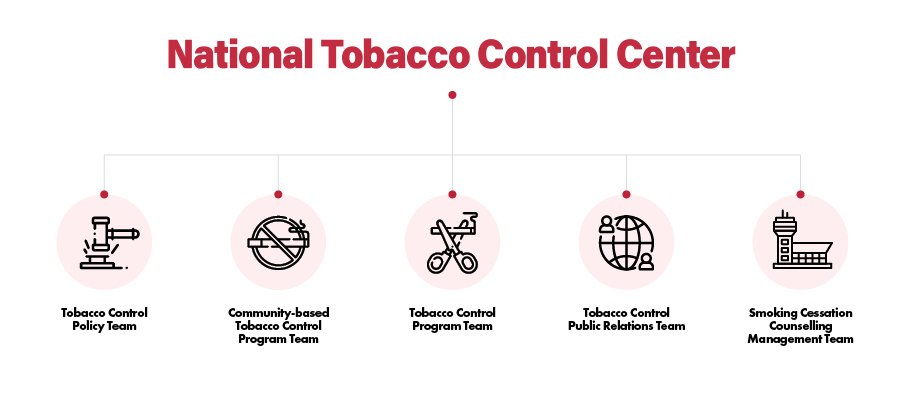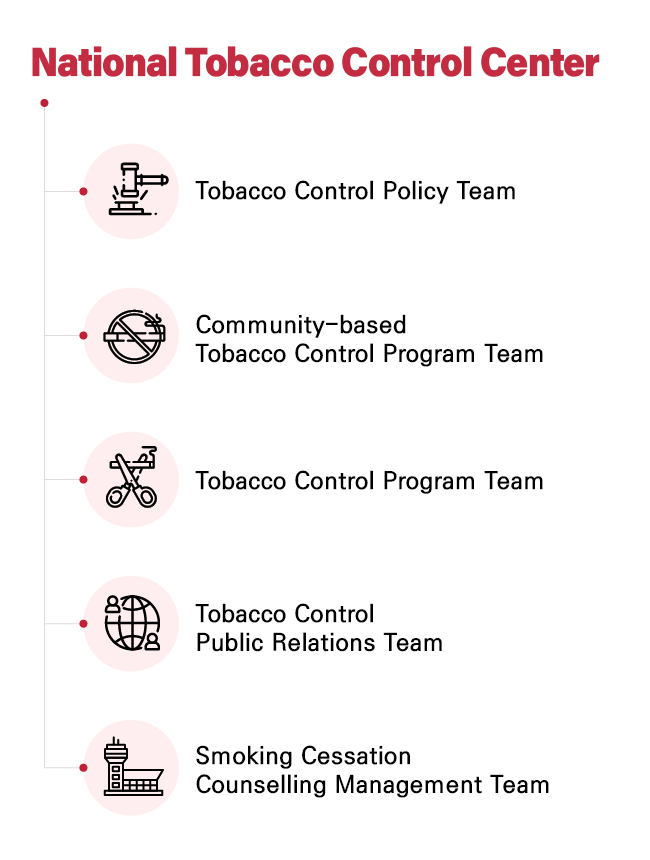What we do


NTCC is comprised of five teams. It performs research and development of tobacco control for implementation of the WHO Framework Convention on Tobacco Control. NTCC also conducts program management and assessment for tobacco prevention and cessation at local communities.
Development and Management of Tobacco Control Policies to Reduce Tobacco Usage in Republic of Korea
Monitoring of the tobacco market and tobacco product usage
The National Tobacco Control Center (NTCC) monitors tobacco markets and tobacco product usage in Korea and abroad, and the adoption of policies and their effectiveness.
Health warnings on tobacco packaging
The NTCC develops and operates health warnings on tobacco packaging to prevent tobacco usage and encourage quitting.
Research and development of tobacco control policies
The NTCC identifies and performs research on topics to provide evidence based policies and services.
Monitoring of tobacco marketing
The NTCC monitors tobacco advertising, promotion, and sponsorships, and works to control the advancement of tobacco usage.
FCTC support and international cooperation
The NTCC bolsters efforts for tobacco control through cooperation and exchange with the WHO and the secretariat and parties to the FCTC.
Participation in ITC (International Tobacco Control Policy Evaluation Project) research
The NTCC contributes to the development and improvement of tobacco control measures by studying its effectiveness and comparing results of international studies.
Designation and management of non-smoking areas
The NTCC designates non-smoking areas and monitors its progress and performance
Program to prevent smoking at schools and underage smoking
Education program to warn of the harms smoking to young children
Education programs for young children to warn of the harms of smoking are planned and managed to prevent tobacco use of young children (ages 3 to 5).
Program to prevent smoking at school
Technical support and program management for school smoking prevention classes are offered to schools to prevent the use of tobacco and encourage quitting of elementary, middle, and high school students. Cultural events and training programs are also offered to students and teachers.
Smoking cessation support services for smokers
Operation of Quitline (1544-9030)
Information is provided to help anyone quit smoking and to prevent tobacco use. Multi-channel counseling services are provided based on developed protocols by demographics and motivation levels to quit.
Operation of online smoking cessation services
Smoking cessation support systems have been established on the Internet and mobile platforms through No Smoke Guide, and a database of evidence-based related information has been created and various self-quit services are also planned and offered.
Management of local community smoking cessation programs
Technical support and management is offered to public health centers nationwide so that smoking cessation clinics can be operated effectively.
Support for local tobacco control centers
Technical support, management, and assessment services are offered to the local tobacco control centers so that programs such as smoking cessation camps for heavy smokers and door-to-door smoking cessation services can be operated effectively.
Smoking cessation support services for smokers Operation of public awareness campaigns to promote a smoke-free culture
Establishment of nationwide anti-smoking campaigns and cooperation with external parties
Public awareness efforts are pursued together with public and private sector organizations, and academic scholars with mid and longterm strategic objectives in mind, and nationwide anti-smoking campaigns are systematically organized and executed.
Planning and execution of nationwide anti-smoking campaign programs
Customized awareness content is planned and developed according to specific demographics such as adult smokers or teenagers, and the progress and results of such programs are monitored and evaluated.




